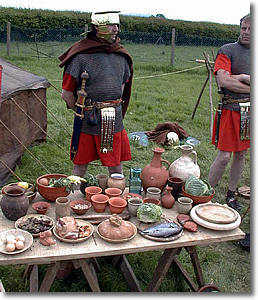"There must be (on the spot) excellent doctors, skilled in healing wounds and extracting missiles, equipped with the appropriate medicines and instruments..." Philo of Byzantium, 3d Century B.C".Via.
This morning I was reflecting on a comment made on Phil Baker’s Blog (which always provides food for thought) that people in the Church should be less focused on their own needs, and more focused on service to Christ and what they give to the Kingdom.
This is so true in our "'Its all about me' ―Consumer Culture".
However, if people in the Church are to be compared to an army of soldiers who go in "boots and all" as per the correct analogy used, (noting that "onward Christian soldier" is a a great driving analogy that somewhere in our recent history we seem to have lost) then possibly the Church could learn much from the great armies of history.
It occurred to me that one of the factors that made the Roman Army, so great was the fact that it had trained medics that would go right into the warzone caring for their fallen and wounded – those who need food or drink, those who are metaphorical Prisoners of War, those left without shelter, in the cold, sick or lonely.
"The importance of medical support in military campaigns is documented throughout the history of civilization. The Sumerians, 4000 to 2000 B.C., may have been one of the first of the world's armies to provide organized medical care to forces in the field. Chiseled into the Stele of Vultures (a monument dating to 2525 B.C.) is a picture depicting the collection of wounded and the digging of graves for those who had perished. Perhaps the Sumerians were also the first to recognize the need for surgeons to be close to the action.
There exists text documenting the complaints of soldiers that the physicians remained in the rear areas to avoid capture or harm.
It was, however, the Roman Empire that put the word "medic" in our language. The Roman's unit level medical officer was known as the "medicus" and their equivalent of today's enlisted medic was called "medicus ordinarius". The medicus ordinarious was drawn from the ranks of soldiers and trained by the Roman army. Our own armed forces traditionally train and employ technicians to care for troops in the field just as the early Romans did. Today they are called "medic, corpsman, or med tech." The simplicity of this word, medic, is underscored by the immense contributions made for their brothers and sisters in uniform. The military medic's history is richly diverse - with many tales of personal sacrifice and valor".

It’s great to send cards, emails and gift baskets, but we must take more risks, get better and perhaps a little more courageous in caring for our own casualties. We need to take risks and get out of the comfort of our base camps and into the warzone. I need to get much better at it myself.
Take time to place a call, or to personally visit, to provide meal, or baby-sit kids.
When we care for our casualties of war – we do in fact care and serve Christ himself "boots and all". (Matthew 25:34-39).

1 comment:
Well said. Over the years it has been my mission to care for church casualties.
Now I'm one myself, a church casualty, and medics are fairly thin on the ground.
I'm battle weary, scarred and bleeding. And it scares people off. Not too many courageous people left in the field these days.
Post a Comment